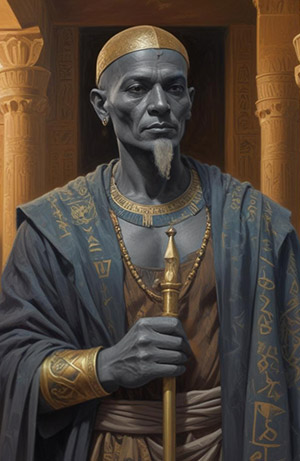Imhotep is the only ascended mortal in the Pharaonic pantheon - an advisor to kings, builder of pyramids, and paragon of knowledge who rose to become the god of healing and science.
Imhotep's clerics are generally peaceful healers who strive for the betterment of all humanity. Many dabble in the sciences, particularly architecture, and they often serve as the chief architects and engineers for the construction of temples to all the gods in the pantheon. These clerics are vastly popular among the common people, who rely on them for all varieties of healing. They wear the white robes common to most Pharaonic clergy, and shave their heads if they are male (which most are).
Imhotep's key doctrine is that knowledge, science, and magic should be used to help humanity. While Thoth teaches the collection of knowledge for knowledge's sake, and Anubis guards secrets of herbalism and magic, Imhotep insists that knowledge is only useful if it is used, and it must be used for the good of all. Though Imhotep is not a god of magic, his doctrine applies to magic as much as to the science of engineering. The appropriate use of magic is to help others, not harm them. While not explicitly pacifistic, Imhotep places much more emphasis on healing than on warfare, in stark contrast to other Pharaonic deities.
Imhotep was portrayed in a white robe with a shaven head, seated and holding a papyrus roll, sometimes holding a staff. Occasionally he was shown clothed in the archaic costume of a priest.
Imhotep's mother was a mortal named Kheredu-ankh, she too being eventually revered as a demi-goddess as the daughter of Banebdjedet. Alternatively, since Imhotep was known as the "Son of Ptah", his mother was sometimes claimed to be Sekhmet, the patron of Upper Egypt whose consort was Ptah.

